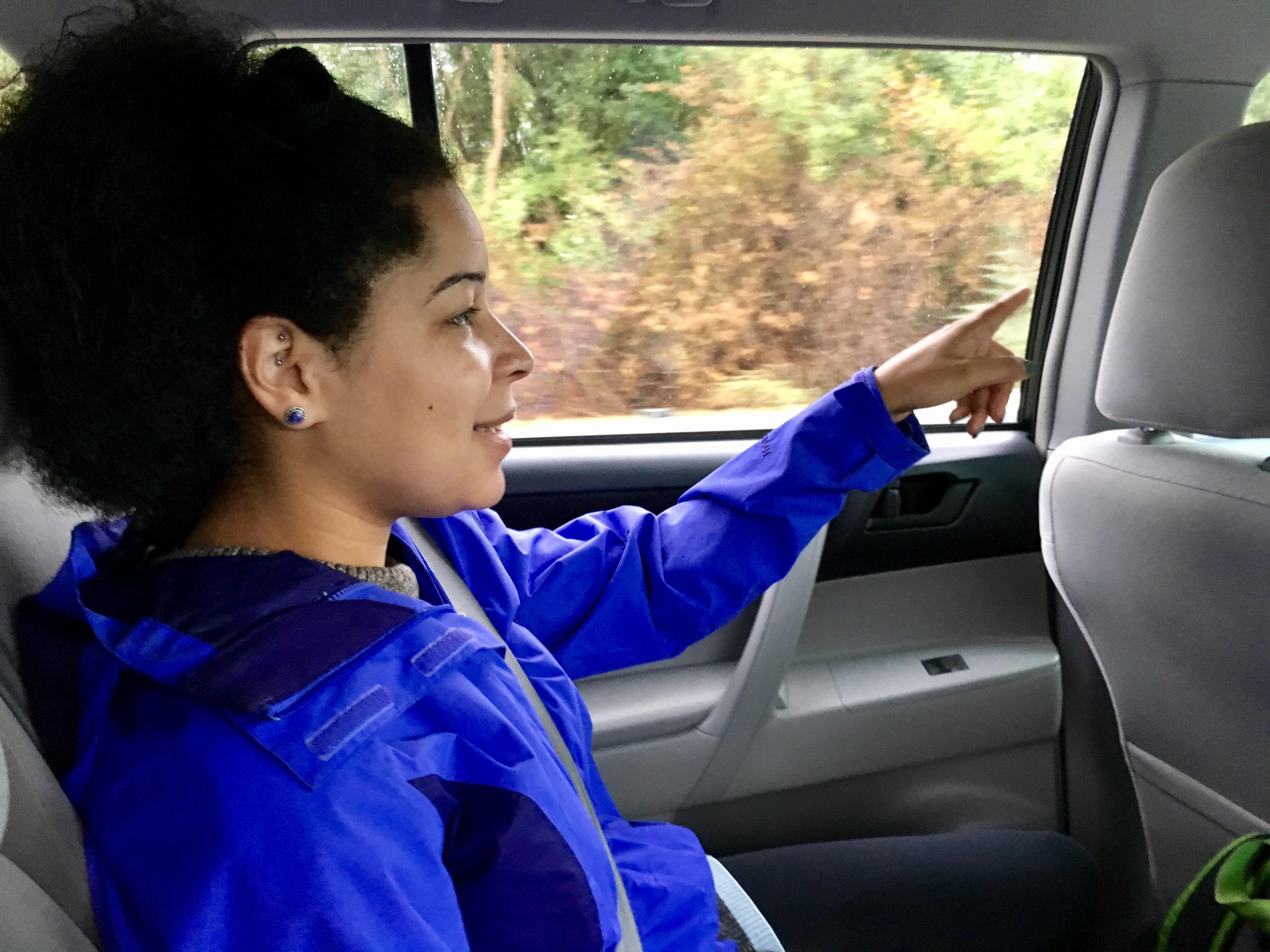
On a rainy morning, North Shore Community College nursing student Dania Matos, 22, orders an Uber from Northshore Mall in Peabody. (Lydia Emmanouilidou/WGBH)
As Patricia Gentile settled in as the new president of North Shore Community College (NSCC) in January 2014, she looked out of her window and saw a long line of cars pulling up, and passengers piling out.
“So I asked my assistant ‘What’s going on down there?' And she told me ‘Oh that’s people just dropping off students.’ ‘Why so many?’ ‘Well we don’t have any bus service here.’ And that’s how I found out that this campus was not accommodated by public transportation,” Gentile said.
NSCC's Danvers campus -- one of three -- serves about 7,000 students -- nearly half of all college students. But students who need to get there have limited transportation options.
The closest public transportation stop to the campus is at the Liberty Tree Mall in Danvers -- about 4 miles away from the campus.
"You can get to shop but you can't get to college," Gentile said, adding that because of its located off of the highway (Route 1), the campus is not accessible by foot or bicycle.
"You have to take... some kind of vehicle transportation here," Gentile said.
But for many NSCC students, buying a car in simply not an option.
“Because we have such a significant number of middle income and lower income students, having public transportation makes the difference between coming to college or not,” Gentile said.
This problem is not unique to NSCC's Danvers campus.
"Students really are leaving because of seemingly non-academic reasons like transportation,” said Melinda Karp, Assistant Director of the Community College Research Center at Teachers College, Columbia University.
For decades, Karp and her colleagues been researching how to improve the community college system. She says students at these two-year institution face a host of challenges that their peers attending four-year institutions do not.
“They're balancing work and school. They’re balancing family. They’re commuters, so they are living somewhere where they have to travel to campus,” Karp said.
But when colleges provided the kinds of supports that “make life feasible,” Karp says, students are more likely to stay in school.
At the Danvers campus, President Gentile set out to overcome the transportation problem. First she turned to the Massachusetts Bay Transportation Authority (MBTA), requesting that a nearby bus route be extended to the campus. But the agency needed proof of ridership -- numbers Gentile couldn’t provide.
“So we didn’t get much traction from the MBTA on extending… even one bus line to the campus. And so we looked for alternatives. We did some studies and, at one point, somebody recommended that we talk to Uber to see what could be done,” Gentile said.
Out of that conversation was born the North Shore Community College Uber Ride program.
The ride-hailing company says the partnership is the first of its kind.
The deal gives students an affordable option to get to campus. Students can request a car from three select nearby public transit locations, including the Northshore Mall, which is about five miles away from the Danvers campus.
That’s where students like Dania Matos, 22, go to request their rides.

North Shore Community College nursing student Dania Matos, 22, rides an Uber to get to class.She says NSCC partnership with Uber has been "a lifesaver." (Lydia Emmanouilidou/WGBH)
Matos, who lives in Salem, takes the 465 bus to get to the mall, and then takes an Uber ride to get to campus.
The nursing student -- along with all students enrolled in health care programs -- is taking all of her courses at the Danvers campus this semester. She says her school’s partnership with Uber has been “a lifesaver.”
“Before this program... came about, I was just gonna do day by day… And it would’ve just been figuring out If I can find a friend or taking a regular Uber which would have costed a lot more than it does,” Matos said.
That’s because, under this deal, the community college is paying for the first ten dollars of each ride. To get to the campus from this location, Matos has to pay about $3 out of pocket each way.
To cover Matos’ and other students’ costs, NSCC has allocated about $40,000 in this year’s budget -- less than half of the $100,000 it usually spends to run a van between its three campuses.
For students like Mators, the reliability and flexibility of the Uber rides is making a difference.
“It gives me more range and flexibility in how or what time I can stay at school until and just having the security of knowing that I have my way to and from without having to bother anyone else,” Matos said.
President Gentile plans to bring the data collected from the Uber pilot with the Danvers campus to the MBTA, to prove that there is enough demand to justify adding bus service.
“That’s the end game because, in the end, having public transportation, coming to community college and commuting is essential for our students to be able to get here,” Gentile said.
While she awaits commitment from the MBTA, Gentile says she has been fielding calls from other colleges – in New England and beyond – interested in finding out how they can go about setting up Uber partnerships of their own.
You can find our five-part series College Material: Community Colleges Comes Of Age here.










